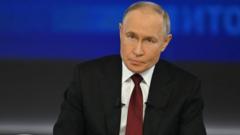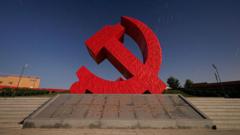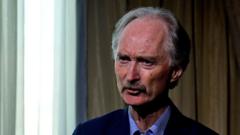The Vatican has announced the two-year extension of its agreement with Beijing regarding bishop appointments, emphasizing ongoing dialogue despite criticisms concerning religious freedom.
Vatican Renews Agreement with China on Bishop Appointments

Vatican Renews Agreement with China on Bishop Appointments
The extension of a key accord reshapes Catholic presence in China amid ongoing human rights concerns.
The Vatican confirmed on Thursday that it has renewed its landmark agreement with China regarding the appointment of bishops, initially established in 2018, a move signaling continued cooperation with Beijing. This extension comes in the wake of U.S. Secretary of State Mike Pompeo's recent visit to the Vatican in an attempt to persuade the Holy See to abandon the deal.
The agreement aims to allow China to formally acknowledge the pope's paramount authority within the Roman Catholic Church, especially concerning the country's bishops. In exchange, the Vatican recognizes bishops previously appointed by the Chinese government, despite their earlier excommunication from the Church.
While the specifics of the deal remain mostly confidential, Vatican representatives have described its initial implementation as largely positive, highlighting productive communication and collaboration on agreed issues. A Vatican statement referred to the partnership as vital for both the ecclesiastical and pastoral lifeworld of the Church while aiming at the welfare of the Chinese faithful.
Experts on Vatican affairs view the continuity of this arrangement as a significant stride toward improving diplomatic relations with Beijing, potentially at the detriment of the Vatican's longstanding ties with Taiwan. Critics of Pope Francis express concern over the implications for religious liberties and human rights in China while the Vatican continues to underscore its commitment to fostering better conditions for Chinese Catholics through open dialogue. The ongoing partnership showcases the Vatican's balancing act between fidelity to its doctrine and navigating the complexities of international politics.
The agreement aims to allow China to formally acknowledge the pope's paramount authority within the Roman Catholic Church, especially concerning the country's bishops. In exchange, the Vatican recognizes bishops previously appointed by the Chinese government, despite their earlier excommunication from the Church.
While the specifics of the deal remain mostly confidential, Vatican representatives have described its initial implementation as largely positive, highlighting productive communication and collaboration on agreed issues. A Vatican statement referred to the partnership as vital for both the ecclesiastical and pastoral lifeworld of the Church while aiming at the welfare of the Chinese faithful.
Experts on Vatican affairs view the continuity of this arrangement as a significant stride toward improving diplomatic relations with Beijing, potentially at the detriment of the Vatican's longstanding ties with Taiwan. Critics of Pope Francis express concern over the implications for religious liberties and human rights in China while the Vatican continues to underscore its commitment to fostering better conditions for Chinese Catholics through open dialogue. The ongoing partnership showcases the Vatican's balancing act between fidelity to its doctrine and navigating the complexities of international politics.





















